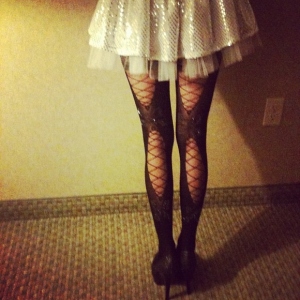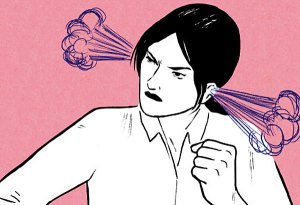When I was fourteen, I was diagnosed with Poly Cystic Ovary Syndrome (PCOS). To cut a very long, and a very awkward, story short, hormonal birth control (also known as “the Pill”) is the only known treatment for it. It’s not a cure, but it works to mitigate the suffering for a lot of women who suffer with PCOS. But it’s the only treatment [edit: occasionally, blood sugar problems can be a part of PCOS, but not always, in my case it is not], because of how it works and what it does, but I’ll get to that in a bit tomorrow.
I had to start taking it at fourteen– the doctor said that if I wanted any chance of ever having children, I would need to take the Pill. And even then, she warned me, I’d probably still need to have a full-blown hysterectomy before I was thirty. If I didn’t take the Pill, everything would get continually worse and I’d need to have multiple surgeries just to keep it under control.
So, I went on the Pill, and I took it faithfully for the next three years. It got my hemorrhagic cysts under control, even though it continued to cause persistent nausea and daily headaches that could blow up into migraines at a moment’s notice.
I also didn’t tell anyone, not even my best friend, that I was taking it.
When I started college, I was faced with a pretty significant dilemma: how was I going to hide taking the Pill everyday from roommates and suite mates? My solution was to put the pills into a regular prescription bottle, but that only worked for about a month, until I got my prescription in the mail. Then I had to figure out ways to get the Pills into the bottle and then hide the packaging– it had my name all over it, so I couldn’t just throw it away anywhere. I got pretty creative, coming up with means to hide what it was.
The fact that I was worried about people finding out about me taking the Pill every day should tell you something. What in the world was I expecting them to think?
Well, for one thing, I was absolutely positive that if someone who didn’t know me very well found out about it, they’d just assume that I was a slut. And secondly, if the administration found out about it (which was not outside possibility, they cared an awful lot about intimate details concerning their students), if something happened, my character would automatically be in question. They’d be suspicious about me.
Because I had PCOS, and was taking the Pill to treat it.
But, I knew that having a “legitimate” medical reason for taking the Pill wasn’t going to change the way anyone had already decided to perceive me. If they found out I was taking it, I knew they would label me a slut, and there would be nothing I could do about it. I was on the Pill– it would be all the proof they needed.
~~~~~~~~~~~~~~~~~~~~
A whole bunch of years later, when I’d figured out that I didn’t give a damn about idiots who would judge me for taking the Pill, I was talking to a woman about some of the pain she’d been suffering. During the course of our conversation, I realized that she probably had PCOS, and when I asked her about it, she agreed– that’s what the doctor had diagnosed her with. For her, it had caused her to lose her job, and she’d been hospitalized several times because of cysts rupturing. The pain had caused her to miss church, to constrain her to her bed for days on end.
I asked her what the doctor had suggested for treatment, and her response was that he’d given her pain killers, but she was trying not to depend on them too much.
“You aren’t on any medication?”
“There’s not any real medication for this, though.”
“There’s the Pill,” I blurted out. “It can help.”
She stared at me, her eyes widening in horror. She leaned in close, and dropped her voice to a whisper, even though we were in my house and the only people around were friends. “You mean, the birth control pill?”
I nodded. “Yes. I’ve been on it for years.”
Again, silence, and her wild eyes boring into me. I watched her think about what I’d said, and I watched terror form. She was completely horrified by my suggestion. “Oh my goodness, no, I couldn’t. I just couldn’t. That would just be so . . . wrong.”
It was my turn to be horrified.
~~~~~~~~~~~~~~~~~~~~~
I should make it clear that this wasn’t in my fundamentalist church-cult. This was from a woman who had grown up in “regular” Christianity. There was nothing extreme about the religion she’d been surrounded by. It was all pretty typical, run-of-the-mill Baptist stuff. And she was still so horrified at the very idea of taking the Pill that she refused to even consider it as an option, even though it is the only medical recourse for her condition.
This is One of the Many Reasons why I have a Serious Problem with the Pro-Life Movement.
Because, and not to put too fine a point on it, they lie to people, especially women. They have spread so many lies for so many years that when a woman could take the Pill to treat a medical condition, she won’t, because the only thing she knows about the Pill is poppycock and hogwash.
So, I present a Crash Course in What the Pill is, For Realsies.
First, the Pill is a really limited concept of birth control. There are so many different kinds of birth control, including Natural Family Planning (NFP), barrier methods (condoms, sponges, vaginal condoms, diaphragms), vasectomy, tubal litigation. For hormonal birth control, there’s oral contraception (the Pill), hormonal and copper IUDs (intrauterine device), Depo-Provera (the “shot”), OrthoEvra (the “patch”), and now things like the NuvaRing.
Some of these are long-term, like the shot or an IUD, lasting from a few months to a few years. The patch and the NuvaRing last for the month, usually. You leave it on or in, and take it off/out for a week to have your period. The Pill you have to take every day, which is a bit of a nuisance.
All of these methods work a little differently, but the one that the pro-life movement has spread the most lies about is hormonal birth control, so I’m going to focus on that tomorrow.










